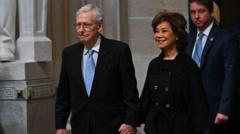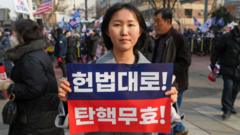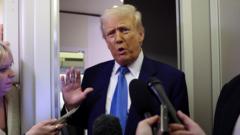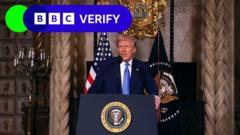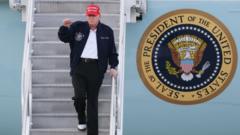At the Munich Security Conference, JD Vance primarily addressed issues of migration and free speech in Europe, suggesting that the continent faces greater threats from within rather than from countries like Russia and China. His comments were met with criticism from several European leaders and raised significant debate on the state of democracy in Europe.
JD Vance Critiques European Democracies at Munich Security Conference
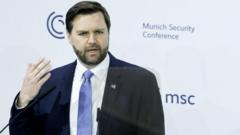
JD Vance Critiques European Democracies at Munich Security Conference
U.S. Vice-President JD Vance's speech in Munich raises eyebrows, focusing on internal threats to democracy rather than external geopolitical challenges.
In a provocative speech at the Munich Security Conference, U.S. Vice-President JD Vance sharply criticized European democracies, asserting that significant threats to the continent stem from its internal governance rather than countries such as Russia and China. In a surprising turn, rather than focusing primarily on the ongoing conflict in Ukraine, Vance chose to emphasize concerns over migration and free speech violations, which he believes European governments, including the UK, are neglecting.
The reception to Vance's address was largely negative, drawing silence from attendees and condemnation from prominent politicians. German Defence Minister Boris Pistorius deemed the remarks "not acceptable," highlighting a tense response from those at the conference. Vance echoed a familiar line from the Trump administration, urging that Europe must enhance its own defense capabilities, particularly as discussions surrounding potential concessions in the Ukraine conflict emerged.
Shifting the focus away from conventional security topics, Vance's speech dove deep into culture-war narratives central to Trump's political approach, which resonated differently in a European context. He accused European leaders, whom he dubbed "EU commissars," of suppressing free speech and held them accountable for soaring migration rates, arguing they have strayed from their foundational values.
EU's foreign policy chief, Kaja Kallas, suggestively labeled Vance's address as an attempt to provoke Europe, home to many of the United States' closest allies. Former U.S. Ambassador to Russia, Michael McFaul, sharply criticized Vance's assertions as "insulting" and lacking factual basis.
Vance brought attention to several European nations, particularly pointing out a legal case from the UK regarding a military veteran banned from silent prayer near an abortion clinic, claiming that basic liberties for British citizens are under significant threat. Days before critical elections in Germany, he ignited discussions on the ongoing political strategy of avoiding coalitions with far-right parties, challenging the notion of political "firewalls" that traditionally safeguard against the ascent of extremism.
In his rebuttal to Vance, Pistorius vehemently defended European democracy, emphasizing the importance of upholding democratic principles while disapproving of comparisons to authoritarian regimes. Vance also referred to recent political instability in Romania, linked to allegations of foreign interference, remarking on the fragility of democratic institutions.
As the conference progressed, Vance met with Ukrainian President Volodymyr Zelensky on the sidelines. Despite their conversation, Vance's earlier speech overshadowed official discussions, prompting a critical evaluation of emerging transatlantic relations in light of such stark rhetoric and its implications for future cooperation on security issues.


